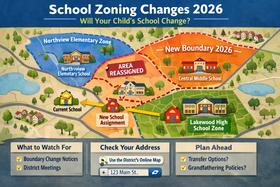While most children can work well within the public school system, kids with special needs require additional help to succeed academically. Unfortunately, not all school districts are equipped to handle students with a wide range of needs properly, and these kids often fall through the cracks without getting the specialized help they desperately need. Fortunately, parents of these kids have legal options when the school system fails.
Failure to Identify Needs
In Wisconsin, a class-action suit is underway to examine how Milwaukee Public Schools answers the call to students with special needs, according to a report in the Milwaukee Wisconsin Journal Sentinel. The lead plaintiff in this suit, Jamie Stokes, is a 16-year-old who reads at a second-grade level and writes at a third-grade level. The young girl has struggled in school since the age of five, but the district would not agree to test her until Stokes failed first grade for the third time. At that point, the district determined that Stokes suffered from developmental delays and required additional support.
Stokes's mother, Kina King, believes that if Stokes had received intervention services earlier, she might be on a more solid academic footing today. King told the Journal Sentinel, "If they gave her the help, she would have been better, not coloring books her sister in kindergarten is doing." Now, the MPS is facing the question of compensation for families with students who were not placed in special education in a timely manner.
The current lawsuit focuses on students who were in the MPS system between the years 2000 and 2005. An attorney for the plaintiffs argues that MPS has done little to correct a flawed system since it was called to their attention in 2007. At this time, U.S. Magistrate Judge Aaron Goodstein found that the district had failed to meet the federal special education law requirements regarding identifying and evaluating students with special needs. This left students in the schools during this time frame without adequate services to succeed despite their disabilities.
This case is far from a decision, although both sides have recommended a remedy to the problem. In the meantime, special needs children within the MPS still risk not getting the help they need in a timely fashion. Pat Yale, the district's director of special education, said, "There's no automatic trigger. It's an individual analysis of each child."
Suing for Services
According to a report at Nola.com, parents in New Orleans are also using legal options to pursue the educational services their children need. Since Hurricane Katrina, New Orleans has seen a huge rise in charter schools within the city. Instead of using neighborhood attendance zones to determine which school children would attend, parents fill out a common application for the Recovery School District. The decision of which school a child will attend is made at the district level.
Unfortunately, parents of children with special needs have not found this system to work in their favor. Many of the charter schools in New Orleans are not equipped to help kids who require specialized services. This leaves many students to fall through the cracks without a central system to ensure they get the education they need. Parents of 10 of these students have filed a lawsuit against New Orleans Public Schools, asking for the necessary services to help their children succeed. No financial compensation is being pursued at this time.
Money for Private Schools
Some parents resort to private schools for special-needs children, which can be pricey. According to the Huffington Post, one family in New York found a way around the cost. In 1997, Tom Freston began a legal battle with the New York City Board of Education over his eight-year-old son's education. Freston argued that the tuition for the school his son attended, the Stephen Gaynor School, should be paid by the district since the public school down the street did not offer sufficient services to help his son. Freston won the case, and the school board was ordered to pay the tuition reimbursement totaling more than $20,000 for the year.
While not everyone agrees with the idea of using public education money to pay for private schooling for children with special needs, most believe that schools need to do more to help these kids. Thanks to a smattering of lawsuits across the country, school districts may be forced to examine how they handle their students with disabilities in the future.
Questions? Contact us on Facebook @publicschoolreview.











